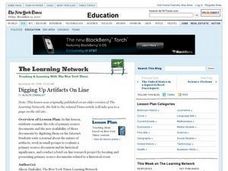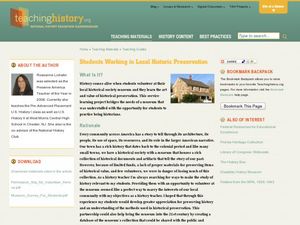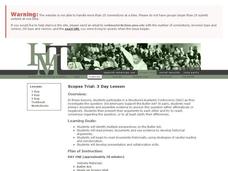Historical Thinking Matters
Spanish-American War: 3 Day Lesson
Why did the United States choose to invade Cuba in 1898? As part of a 3-day lesson, your young historians will first develop working hypotheses to answer this question, then work with a variety of historical primary source documents that...
Historical Thinking Matters
Social Security: 1 Day Lesson
Should the United States provide relief for those who are unemployed? Trace this question back to the Great Depression with your young historians, who will engage in careful reading of historical documents and classroom discussion to...
Curated OER
Stating Your Case: Writing Thesis Statements Effectively
As a writer, if you have a weak introductory paragraph or thesis statement, you might lose your audience! Have your middle and high schoolers practice writing introductory paragraphs that include clear thesis statements in response to...
Curated OER
Decoding US Foreign Policy: The Iran-Contra Affair
This is a really good lesson. Learners explore US Foreign Policy, the Reagan Administration, and the Iran-Contra Affair through various documents and readers theater. Worksheets, script, and web links are all included. Teaching can't get...
Curated OER
Constitutional Convention, 1875: Photographs as Historical Documents
Eleventh graders compare and contrast the two photographs.
Curated OER
Canada's Constitutional Documents
Students analyze one major constitutional document and the events surrounding it. They examine primary sources (historical documents) and draw conclusions from evidence. Students write an essay and may prepare a presentation of their...
Curated OER
US Constitution
Think about the Bill of Rights and the Declaration of Independence with your budding historians. They analyze the importance of historical documents by examining several famous documents, and then they complete activities that check...
National Endowment for the Humanities
The Argument of the Declaration of Independence
When in the course of a course on historic American events, it becomes necessary for learners to examine, with decent respect, the Declaration of Independence, it becomes evident that there are six separate and equal parts of that...
EngageNY
Documenting Research: Sorting and Recording Information About the Wheelwright
Fourth graders practice using a graphic organizer to record their notes and answer text-dependent questions while supplying evidence of how they found their answer. They focus on a machine called the wheelright, which was commonly used...
Middle Level Learning
Philip Reid and the Statue of Freedom
Approach the concept of freedom in United States history from a variety of angles and delve into rich primary source analysis practice. Pupils study the Statue of Freedom, which sits atop the dome of the Capitol building in Washington...
Encyclopedia Britannica
Presidential Electability
There are specific constitutional requirements that candidates must meet to become president of the United States. In addition, there are societal opinions that affect a candidate's electability. Class members examine historical...
Curated OER
A Document-Based Essay on Korean Social Change
Students interpret historical evidence presented in primary resources. In this Korean history lesson, students examine the provided information on life in Korea. Students respond to the questions that accompany each source. Students then...
Curated OER
Documents about the Boston Massacre and the Biases of Their Creators
Students compare and contrast writings about pre-American Revolution events. In this political agenda lesson, students conduct research to determine how bias and perspective have made their way into historical documents. Students examine...
Curated OER
Digging Up Artifacts On Line
Why is it important to preserve historical documents and artifacts? Examine the role of primary source documents and the availability of these documents on the Internet. Middle and high schoolers write a journal about the nature of...
Curated OER
The Two Sides of the Declaration of Independence
Budding historians read six documents related to grievances that led to the writing of the Declaration of Independence. They then craft an essay in which they discuss the perspective of both the colonists and the king. This DBQ could be...
Curated OER
The Movement Before the Movement: Civil Rights Activism in the 1940s
Many educators focus on the civil rights movement as it occurred after Rosa Parks incited the bus boycott. Extend the understanding of the fight for civil rights in the United States with this post-WWII lesson. Learners examine and...
Curated OER
HISTORICAL AND SOCIAL SCIENCES ANALYSIS
Students examine a variety of maps and documents to identify physical and cultural features of neighborhoods, cities, states, and countries, to explain the historical migration of people, expansion and disintegration of empires, and the...
Curated OER
Signature History
Students review the meaning and application of primary and secondary sources in research. They determine how researchers locate primary source documents before looking at signatures as a validating factor on many primary sources....
Curated OER
Students Working in Local Historic Preservation
Students develop an appreciation of history as they volunteer their time in historical museums. For this historical perspectives lesson, students work with valuable local documents as they aid the staff of selected local historical...
Historical Thinking Matters
Scopes Trial: 1 Day Lesson
Why did many Tennesseeans support the 1925 Butler Act, which forbade the teaching of evolution? Using several primary source documents and a brief video clip, your young historians will draw connections between the broader historical...
Historical Thinking Matters
Scopes Trial: 3 Day Lesson
Was the Scopes trial more complicated than a simple debate between evolutionists and creationists? As part of a structured academic controversy (SAC) activity, pupils consider multiple perspectives of the Butler Act and engage in close...
World History Digital Education Foundation, Inc.
COVID-19: Comparison with the Influenza Pandemic of 1918
A timely lesson uses documentation from the Spanish influenza pandemic of 1918 to compare it to the COVID-19 pandemic in 2020. Scholars watch a short video, analyze sources, complete a worksheet, and write a claim with supporting...
Museum of the American Revolution
Dissecting the Declaration
Delve into the past to understand the issues that led to the Declaration of Independence. Academics read excerpts from the Declaration of Independence and take a virtual tour of the American Revolution Museum. The resource explains how...
Museum of the American Revolution
Dunmore's Declaration
To fight or not to fight, that is the question. A thought-provoking activity focuses on the Dunmore Declaration that promised to free enslaved people who chose to fight for the British during the American Revolution. Scholars read the...

























